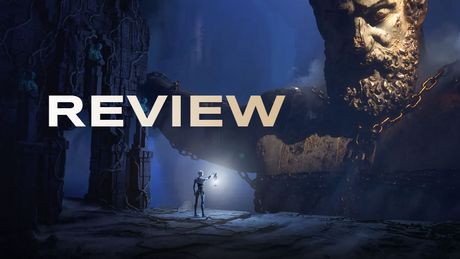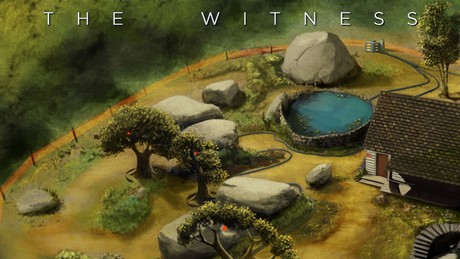The Talos Principle 2 Review: A Mind-Bending Beauty
If you only play one puzzle game this year, The Talos Principle 2—with its engrossing themes of philosophy, existence, and society—has to be it.
Puzzle games can be frustrating when you can’t figure out their solution, but they are amazing when you get that eureka moment when everything finally makes sense. The Talos Principle was one such game when it came out back in 2014, and its sequel expands on elements and themes the original went over. What you get is a philosophical puzzle game that has you thinking before, while, and after you solve its 100+ puzzles.
The beauty of The Talos Principle 2 is that it can be appreciated by both players who conquered its predecessor’s challenges as well as by those new to the series. It’s a game that gets increasingly more complex as you play it but constantly throws you new ways to solve a problem so your mind is always engaged. And that applies both to its alluring narrative and to the inventive puzzles that are a joy to solve.
Exploring your existence
The original Talos Principle stirred up questions about what it means to be human and lets you play as a robot in the future following humanity’s extinction. You were seemingly alone in this game as you solved various puzzles while exploring its mysterious environments that featured texts and that dived deep into various philosophical and metaphysical concepts.
- Inventive and rewarding puzzles that will keep you stimulated until the very end
- A powerful presentation with stunning visuals and a thought-provoking soundtrack
- Conversations that give your actions and character meaning
- Wonky controls when playing third-person mode
- Items are not always selected unless you look at them spot-on
The main difference in this sequel is that you are no longer alone. Instead, you play as the 1,000th robot created by a society of robots trying to pick up where humanity left off over century ago. The themes this time are centered around what it means to be a society and what everyone’s role should be. 1K, as most people call the robot you control, was built to fulfill the goal of New Jerusalem, a city made up entirely of robots who consider themselves human but also understand the mistakes their ancestors made that led them to their extinction.
1K and a few other robots set out on an expedition to investigate a giant pyramid on a mysterious island after a holographic image of Prometheus beckons you to complete its various trials. These are made up of 12 biomes that each hold eight main puzzles with three extra ones for you to solve. In order to make progress and fully explore this megastructure, you will need to solve at least eight puzzles in each area and then make your way to each zone’s central tower to open the way forward. Each area follows the same pattern, but their location and the puzzles you have to solve are not only unique but also make for a game that is truly stimulating.
Familiar yet alien worlds to explore
The biomes you visit are, for instance, a feast for your eyes. Despite taking place in a futuristic society, each area you visit has a ruinous look to it, its own distinct climate, and even different types of architecture that create a mysterious picturesque environment that you just want to explore. You’ll travel to a snowy mountaintop, a flooded valley, and even a vast desert that all look familiar and yet foreign at the same time. Visually, the game is years ahead of its predecessor, and you now get even bigger worlds to get lost in. At the same time, each area you travel to features various signposts that keep you on the right track to solve each of its eight puzzles in order—if you want. You are encouraged, of course, to veer off course and go exploring to find other hidden puzzles, secret structures, and various voice recordings and texts that provide more details on your expedition.
One change from the original is that the game is now entirely voiced and even features conversations you can have with your companions and other fellow robot citizens. Your choices can affect how they think of you and even what actions they take so you can mold 1K into the kind of person you want for yourself. Various conversations will relate to the game’s pending mission of exploring the island, but you will also have the chance to chat about topics that range from cats to what robots experience during sleep mode to even topics about the ongoing politics that make up New Jerusalem. The companions you travel with such as the hardworking Melville to the quirky Yaqut have their own personalities and interests that make getting to know them just as fun as it is exploring your surroundings. At times, you may even want to challenge them to change their mind when the topics discussed are more controversial like law, fate, and civic responsibility. Compared to just reading texts about philosophy, having deep conversations where you can choose the answer makes it easier to feel connected with the game.
Its soundtrack is also one of the best arrangements in a puzzle game I have played. The blend of synth and classical instruments create this world that feels nostalgic but also alien at the same time. Considering the game requires concentration and focusing on solving problems, all the songs you hear complement your actions beautifully and really allow you to relax. This isn’t Portal where you need to be quick and rely on physics. Instead, its soundtrack reminds you to take your time and soak it all in.
Puzzles to get lost in
The other thought-provoking side to the Talos 2 is, of course, its puzzles. What’s great about each zone beyond its unique look is that it also introduces a unique tool that is highlighted in each area’s puzzles. In one zone, for example, you are introduced to a portal gun that makes a hole in certain walls that allow items or even light beams to travel through. In another, you will use an inverter that turns red light into blue and vice versa. These tools are the basis for these puzzles, which get more complex as you solve them in order.
Every puzzle room has a solution, and even the most simple puzzle in the smallest room will fill you with glee the moment you figure out its solution. Some can really be solved in a few minutes, but some can feel like brain busters until you realize the certain order of how you should use each item in each room or how each item can be fully utilized. The longest I spent on a puzzle was close to 50 minutes simply because I didn’t realize I could carry a certain item with me and continue its effect of opening a door in front of me. These moments can be frustrating, but the real reward is getting every solution to each puzzle to unlock the way forward and discovering what new gimmick or gadget the next area has in store for you.
The Talos Principle 2 is a powerful puzzle game that builds on its predecessor and effortlessly takes your mind for a ride.
You can find all our reviews on Metacritic and Opencritic.
What I loved most about the puzzles in Talos 2 is that they start off simple but slowly introduce new elements that you need to figure out. By the time you make it halfway through the game, you will see rooms that stack everything you have learned up until that point to create puzzles that are beautifully layered. Some may appear to be complex conundrums, but their solution is always within reach if you spend enough time examining everything around you and experimenting with different possibilities. I did run into issues when picking up certain items as the game wouldn’t register them unless you looked at them directly. The game is best played in first-person mode, but playing it in third-person mode also made it odd to move around and difficult to properly select or interact with certain items. These are small critiques, but they did exacerbate the stress of feeling stumped during certain puzzles.
Final Thoughts
You don’t need to unlock all eight puzzles in each area to move forward with the story, and you can even find special tokens around the world that let you skip a particularly difficult puzzle and complete it later on if you want. Once you solve enough puzzles, another puzzle in itself waits for you before you enter the tower in each area. These pay homage to the original and involve putting together tetronimoes to build a physical bridge forward. The game knows puzzles are part of its identity and they truly never stop coming.
Lasting around 25 hours and more if you explore all parts each world and solve even the secret puzzles in each area, The Talos Principle 2 is a powerful puzzle game that builds on its predecessor and effortlessly takes your mind for a ride. Its puzzles, philosophical themes, and presentation set the mood for a game that continues to stimulate your senses and never stops challenging your perspectives even after you’re done with it.

Giancarlo Saldana
Giancarlo grew up playing video games and finally started writing about them on a blog after college. He soon began to write for small gaming websites as a hobby and then as a freelance writer for sites like 1UP, GamesRadar, MacLife, and TechRadar. Giancarlo also was an editor for Blast Magazine, an online gaming magazine based in Boston where he covered various video game topics from the city's indie scene to E3 and PAX. Now he writes reviews and occasional previews for Gamepressure covering a broad range of genres from puzzle games to JRPGs to open-world adventures. His favorite series include Pokémon, Assassin's Creed, and The Legend of Zelda, but he also has a soft spot for fighting and music games like Super Smash Bros and Rock Band. When not playing Overwatch after a long day at work, he enjoys spending time working out, meal prepping, and discovering new international films and TV shows.
more

The Talos Principle 2 Review: A Mind-Bending Beauty
game review
If you only play one puzzle game this year, The Talos Principle 2—with its engrossing themes of philosophy, existence, and society—has to be it.

The Witness review – the Darks Souls of puzzle games
game review
Colorful graphics, couple of hundred of riddles, narration through environment, and, at times, extremely high level of difficulty is the Braid's author's recipe for the perfect logic game. But such a meal my not be digestible for every player.





